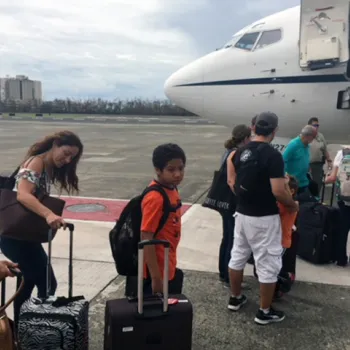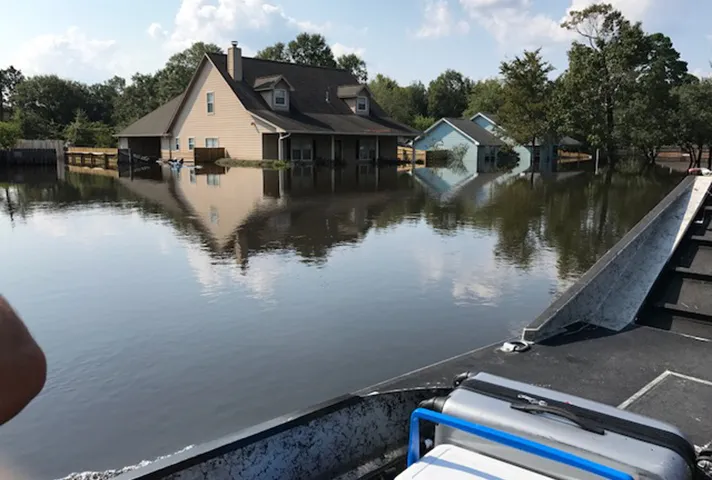
A view of flooding in a Beaumont subdivision where several court employees lived when Hurricane Harvey struck southeastern Texas in August.
When Hurricane Harvey reached Beaumont, Texas, it struck with force and then refused to budge. For three days, the storm hovered over the city of 118,000 people, pelting it with fierce wind and rain, swelling creeks and bayous, knocking out the city’s water plant, and inundating neighborhoods with polluted water. Magistrate Judge Keith Giblin’s house was spared, so he decided to see if he could help an overwhelmed fleet of first responders. Giblin hauled his 16-foot aluminum fishing boat to a spot off Highway 105, and launched it into the dirty, swirling floodwaters. He says people stranded by the flooding were not hard to find.
“You could see people waving (from windows) or people would come out of their houses and shout addresses of someone who needed help,” Giblin said in a recent interview. He rescued one man who, he recalled, carried over his head in four feet of water not a suitcase, not photo albums, but something he prized more: a large, pudgy mutt. “It just breaks your heart to see people who’ve lost everything,” Giblin said.
Hazarding unpredictable, fast-moving water, downed electrical lines, and the occasional water moccasin, Giblin navigated his passengers to higher, dryer ground where they could summon family or friends for help, and then returned to search for others.
Judge Giblin’s story is one of many examples of members of the federal Judiciary family responding during one of the worst weather seasons on record with what Chief Justice John Roberts has described as “extraordinary neighborliness, generosity, and dedication.”
In the fall of 2017, the terrible trio of Hurricanes Harvey, Irma, and Maria destroyed and crippled buildings, including courthouses, shut down roads and airports, flooded homes and businesses, and left court employees without power in Texas and Florida and especially in Puerto Rico and the U.S. Virgin Islands. Court staff at the Santa Rosa, California courthouse were beset by a different weather-related disaster: some of the deadliest wildfires in the state’s history.
Throughout the crises, judges and court personnel, Roberts noted in his year-end message on Dec. 31, “responded in dedicated and even heroic fashion.”
We saw the best of what the Judiciary and its partners can offer in these circumstances.
Courts helped other courts in the storms’ path while individuals organized collections for colleagues who lost homes, clothing, furniture, and a lifetime of keepsakes. The Emergency Management and Preparedness Branch of the Administrative Office of the U.S. Courts (AO) worked around the clock providing logistical support and directing resources to affected courts. The Chief Justice also expressed appreciation for invaluable assistance provided by the Judiciary’s government partners, including the General Services Administration (GSA), the Federal Bureau of Prisons, and the Federal Emergency Management Agency.
First Circuit Executive Susan Goldberg, who took part in a collaboration among the circuit, the District of Puerto Rico, the AO, the U.S. Marshals Service, and the GSA, said, “We saw the best of what the Judiciary and its partners can offer in these circumstances.”
While it may not be possible to gather in one place every story of sacrifice, courage, and dedication throughout the Judiciary during the natural disasters of 2017, here are a few of them:
Beaumont
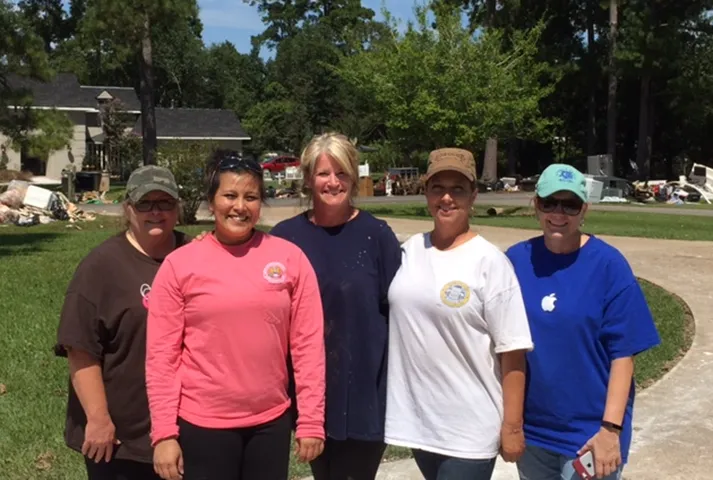
Volunteers from other court divisions take a break in front of debris at Courtroom Deputy Sherre White’s flooded Beaumont, Texas house. From left are Case Administrator Charlene Hinton; Chief Deputy Clerk Mel Martin, of Texarkana; White; and Judicial Assistant Shedera Combs and Case Administrator Sonja Oliver, both of the Texarkana division.
Chief Judge Ron Clark of the Eastern District of Texas is among 24 Beaumont-based court employees whose homes were either heavily damaged or destroyed by Harvey.
In the first days after the storm and flooding, Clark said, most roads into Beaumont were closed, prompting the National Guard to fly in supplies of food and water. Outside the southeastern Texas city, helicopters dropped hay to stranded horses and cattle. Flooded houses sat for four days while Clark and the others waited for the water to recede. Intense heat and standing, contaminated water filled their former living spaces with a toxic soup and rapidly growing mold.
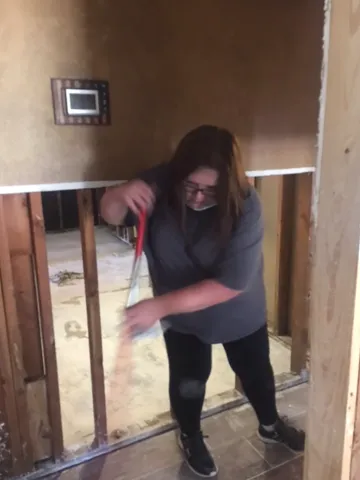
Case Administrator Charlene Hinton traveled from Marshall, Texas to help Beaumont colleagues whose homes were severely damaged in the flooding. She sweeps up at Courtroom Deputy Sherre White’s house where the bottom half of a wall was removed.
The lifeline for the Beaumont court employees who lost homes was a caravan of two dozen colleagues from the Tyler, Marshall, and Texarkana divisions, who arrived in cars and trucks filled with rubber boots, gloves, masks, and cleaning supplies. For days, they helped drag ruined furniture and appliances to the curb, tore out flooring, walls, and layers of sheetrock, and moved anything salvageable into storage. Also volunteering in the massive cleanup efforts were U.S. marshals, assistant U.S. attorneys, agents from the Drug Enforcement Administration, and staff from the Beaumont court division.
“It was just an incredible display of generosity,” Clark said. “They were taking a risk. The water was polluted, and they were working in houses where there was mold everywhere and in the air. You’d walk out to the yard and find various snakes looking for a dry place. These were very unpleasant conditions. For them to do this really affected the morale of the whole court.”
******
Things were little better at Beaumont’s Depression-era courthouse, which suffered severe water and mold damage. Like the rest of the city, it also had no water service after Harvey shut down the city’s water supply, prompting the GSA to temporarily close the courthouse.
In a series of hours-long conference calls, Clark and clerk David O’Toole consulted with other court unit executives from defender services, probation and pretrial, the Marshals Service, and the U.S. Attorneys Office, looking for a way to keep critical court operations going, especially for time-sensitive criminal cases.
“Our first priority was the safety of our court staff,” O’Toole said. “We also felt a sense of obligation to do all we could within reason to keep court operations going.”
Clark decided to move court operations to other divisions in the Eastern District so that Beaumont-based judges could continue their most pressing criminal cases. (Less sensitive criminal cases and civil cases were rescheduled or postponed, requiring long and tedious hours of logistical rework.) Clark and Judge Marcia Crone, with a small cadre of law clerks and chambers staff, decamped for courthouses in Lufkin and Plano for two weeks, lodging in nearby hotels, until the Beaumont courthouse was reopened.
Houston
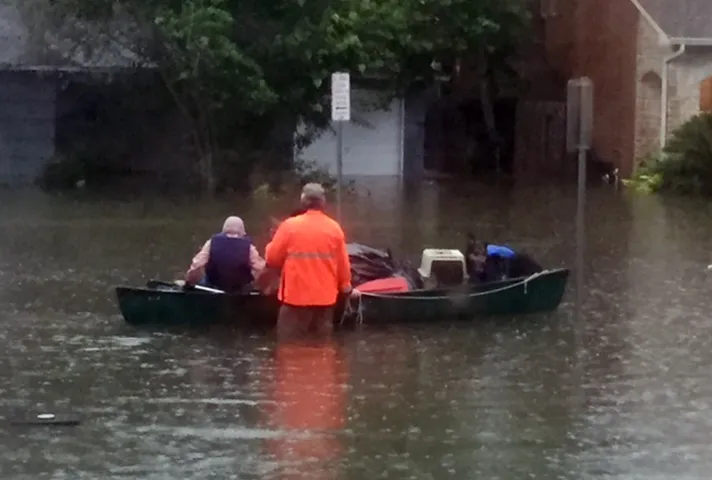
Court Security Officer Jack Simmons heads back to his canoe after checking on Fifth Circuit Judge Gregg Costa. Simmons and wife, Cynthia, had to evacuate their home during the flooding in Houston.
In Houston, where Harvey also produced massive flooding, members of the Fifth Circuit Court family looked out for each other in sometimes extraordinary ways.
Early on the Sunday morning after the storm, Fifth Circuit Judge Gregg Costa was lugging furniture from the main level of his home to the second story as rapidly rising water filled the front yard. His wife, Jennifer, heard a knock at the door and, surprised that anyone would be calling, the couple found Court Security Officer Jack Simmons standing outside in hip-deep water, asking if they needed help.
Simmons, who lives about a quarter mile from the Costas, had paddled to their house in a canoe that he kept in his yard for recreational use. When his own single-story house flooded with three feet of water, he and his wife packed their two dogs and cat in the canoe and set out for a shelter at a local church. On the way, Simmons decided to check on Judge Costa. He knew the judge had small kids and wondered if he needed help evacuating. When he arrived, the judge told Simmons that he and his family could safely stay put, and the two exchanged cell phone numbers in case the situation changed.
“What an extraordinary act,” Costa said. “I think we sometimes take for granted how committed our court staff is. Something like that really shows that at a time he was facing personal devastation, Jack was thinking about the court.”
Simmons, a former Houston police detective, and his wife, Cynthia, a dental hygienist, lost everything in the storm, except some kitchen items and framed photos of their four sons. Gone are their house, their cars, all their furniture, and their clothes.
But the court family made sure the story had a happy ending: Fifth Circuit Senior Judges Carolyn Dineen King and Thomas Reavley, who are married, gave the Simmons’ free lodging in their garage apartment for four months while their home was being rebuilt.
“Otherwise, we’d be living on top of relatives,” Simmons said. “It meant the world to us.”
Virgin Islands

A U.S. National Guardsman helps a woman in St. Croix carry water and emergency supplies after Hurricane Maria struck the island. (FEMA photo)
The story in the Virgin Islands was of one island court helping another. St. Thomas was hit first by powerful Irma. Without exception, court employees lost rooves, clothes, food, and whole lifetimes of personal effects in the flooding that followed. “The damage to St. Thomas was catastrophic,” said Glenda Lake, the Virgin Islands District clerk.
Supermarkets remained closed for several days and water was scarce. The employees in the St. Croix court took up a collection to buy water, canned goods, fans, batteries, and bug spray for their colleagues an island away. Ferry service between the islands was shut down, so they hired a private boat operator to take the care packages across the stretch of Caribbean Sea from St. Croix to St. Thomas. Lake said that a shipment of MREs arranged by the AO also was an enormous help, arriving just a few days after the hurricane struck.
Then, two weeks later, Maria struck St. Croix. The courthouse employees who had helped their colleagues a couple of weeks earlier were suddenly in similar dire straits: no electricity, no water, flooded homes, and impassable streets. The St. Thomas court staff had very little to give in the way of provisions that wouldn’t impact their own survival. So they took up a collection and sent their St. Croix colleagues gift cards to the local Kmart, the rare store that was open and operating in the early days after the hurricane.
Third Circuit Chief Judge D. Brooks Smith and two of his colleagues heard cases in the Virgin Islands in December, shortly after water-damaged courthouses reopened.
“The Third Circuit sits in the Virgin Islands every May and December. It was essential that we had our regular scheduled sitting despite the conditions on the island and transportation challenges,” he said. “The lawyers were well-prepared and ready to go. The courts worked vigorously, with excellent support from GSA, to open as soon as possible. This was very important to the community."
Puerto Rico
In Puerto Rico, as in the Virgin Islands, the destruction from the hurricanes was catastrophic. In interviews, court staff said that no part of the U.S. territory was left untouched by Maria, a maximum-strength, Category 5 storm. Unlike in Texas, Florida, and other mainland states, an island by nature is more difficult to reach with emergency goods and services, especially when ports are heavily damaged as they were by Maria’s 155-mile-an-hour winds.
It was terrible. We’ve had hurricanes, but never had we had such a devastating hurricane.
Emerging from her house the next day, District Clerk Frances Moran recalled, the hurricane “had turned our emerald green island into a war zone. It was terrible. We’ve had hurricanes, but never had we had such a devastating hurricane.” Like most people, she spent the first week locating food and water and assessing the damage to her home.
By the second week, she and Chief Judge Aida Delgado-Colon met at the courthouse and began to determine the whereabouts and circumstances of their employees, relying mostly on word-of-mouth communication because phones and email were inoperable. “For us, it was very important to know they had survived. Little by little, we were able to find people,” Moran said.
As operations were slowly restored, the court set flexible hours so that employees could deal with their property damage and the pressing need to locate generators and fuel in the extreme heat. With schools closed, employees brought their children to work.
Two judges involved in Puerto Rico’s massive bankruptcy case, New York Southern District Judge Laura Swain and Texas Northern Bankruptcy Chief Judge Barbara Houser, sent the courthouse staff care packages of food, batteries, fans, and bug repellent. Judge Swain, who presides over the case, said the court staff in Puerto Rico worked in ingenious ways to keep the case going despite extreme personal hardships, including setting up a rotation of duties so that someone with access to a generator was always available to handle the filing and docketing of orders. “They continue to provide extraordinary support for the heavy (case) workload,” she said.
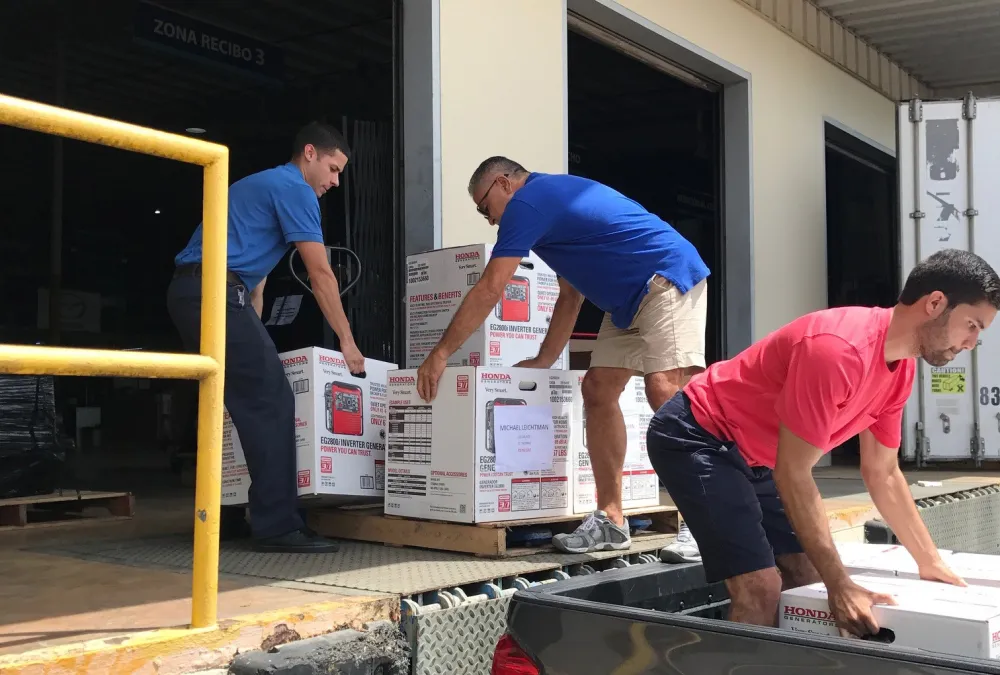
Federal defenders in Puerto Rico load generators onto a truck for transport to the Virgin Islands, where probation officers waited for them to charge phones and computers used to monitor ex-offenders.
On the fourth day after Maria struck, Puerto Rico District Probation Chief Eustaquio Babilonia was finally able to get to work and was amazed to find 25 of his staff already there. They quickly organized search parties to fan out across San Juan and outlying areas to look for 40 unaccounted-for staff members. Eventually, everyone was found. Some had lost their homes, almost everyone had damage to their houses, and all were without water and power.
But the staff felt it was critical that they get back to work as soon as possible. Babilonia got authorization from the AO to purchase emergency generators to ensure they had power to run computers and phones. Meanwhile, probation staff across the country learned of their colleagues’ plight and sent boxes packed with batteries, fans, solar lights, insect repellant, and Amazon gift cards.
The probation office for the Southern District of New York volunteered to monitor arrest notices from the National Crime Information Center for anyone under supervision in Puerto Rico. The effort was critical, given that ex-offenders were likely seeking shelter at community locations along with everyone else. New York Southern probation employees also held a benefit luncheon to raise money for their Puerto Rico colleagues.
Despite what happened, it has made us stronger and closer as a probation family.
“We are so appreciative of everyone who reached out,” Babilonia said. “Despite what happened, it has made us stronger and closer as a probation family.”
Eventually, the probation officers were able to locate or contact all 3,500 people on pretrial supervision or probation. They focused on the 200 highest risk offenders, with histories of either violence or sex offenses, and succeeded in finding all of them; two who had taken refuge in emergency shelters were moved to other lodgings.

Motorists in Puerto Rico wait in line to buy fuel for cars and generators. (FEMA photo)
Puerto Rico Federal Defender Eric Vos was feeling similar pressure from the ticking clock.
Two weeks earlier, before Maria struck, Vos had been busy helping his Virgin Island colleagues. Learning of delays getting generators to Virgin Island’s probation officers, Vos contacted a local vendor he knew and organized his employees who owned pickup trucks to transport the generators to the airport. There, they were loaded on a helicopter for delivery to the Virgin Islands.
Now, Vos had serious problems of his own.
All modes of communication were down: landline phones, email and internet service, and most cell service. So Vos set up a network for communication on the “whatsapp” app, which enabled him and his staff of 60 to communicate by cell phone about the safety of colleagues. They also were able to share critical information about the availability of food and bottled water and the length of waits at gas stations to obtain generator fuel, which could range up to 22 hours. One day, Vos found diapers for sale at a local store, bought as many as he could, and delivered them to employees with children who had run out.
It soon became clear that it would be months before power was restored, so Vos tapped into his local source for generators, this time so his own staff could get back to work.
******
Approximately 1,200 prisoners were airlifted from the detention facility in Puerto Rico to a newly built prison in Mississippi and to other facilities in Florida, Alabama, and Georgia, with the bulk of them going to Yazoo City, Mississippi. A few hundred prisoners were awaiting sentencing or had other critical aspects of their cases pending, such as detention hearings.
Judges in the District of Mississippi volunteered to handle the hearings, on top of their regular caseloads, while the AO organized the paperwork for the special assignments. Two federal defenders from Puerto Rico, who had no children or elderly relatives to care for, volunteered to go to Mississippi to represent the prisoners.
Vos and the remaining 25 attorneys on the island set up a makeshift operation that allowed the Puerto Rico-based staff to feed the two Mississippi-based defenders the research and information they needed to prepare for the hearings, ensuring all the detainees had the benefit of defense counsel.
The Aftermath
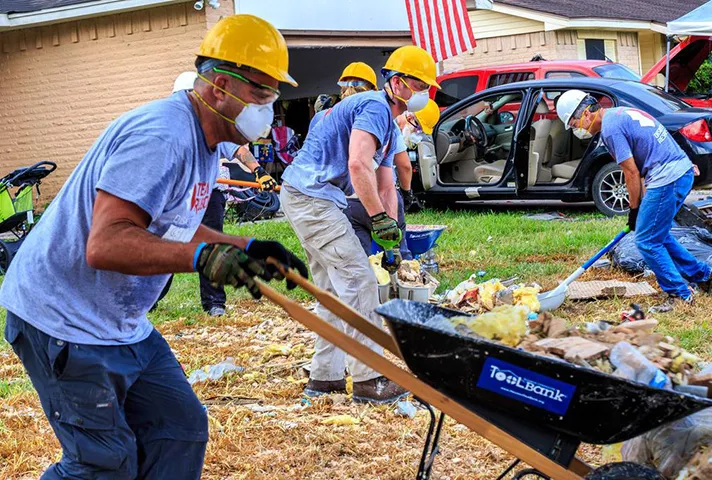
Volunteers remove debris from a damaged house outside of Houston. (FEMA photo)
For some, life has returned to normal in the weeks since the hurricanes and wildfires ended in late 2017. But in the hardest hit areas, complete recovery is still months, even years, away.
Although water service has been restored in Puerto Rico, half of residents are still without power. The work day at the San Juan courthouse ends no later than 4 p.m. so that employees can make it home before sundown to avoid dangerous, unlit roads. Court staff on both St. Thomas and St. Croix continue to live in houses with damaged rooves and boarded-up windows while awaiting insurance settlements.
And in Beaumont, Judge Clark has daily reminders of Harvey. A portion of his chambers is draped with tarp, where water damage is being repaired, and every evening he returns “home” to a sparsely furnished, rented apartment while he and his wife await a flood insurance decision from FEMA on a house that, like many others, will have to be rebuilt from the studs out – and most contractors are already booked into the foreseeable future.
“We’re like college kids again,” Clark joked about his temporary digs.
Lake said: “It’s a long-term process. It won’t be immediate and it won’t be in the next year. We will be trying to recover for quite some time.”
Subscribe to News Updates
Subscribe to be notified when the news section is updated.


